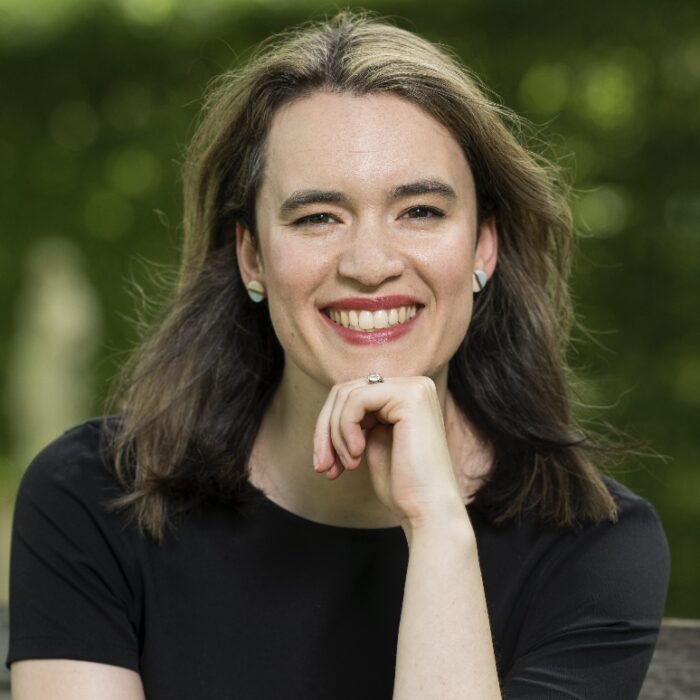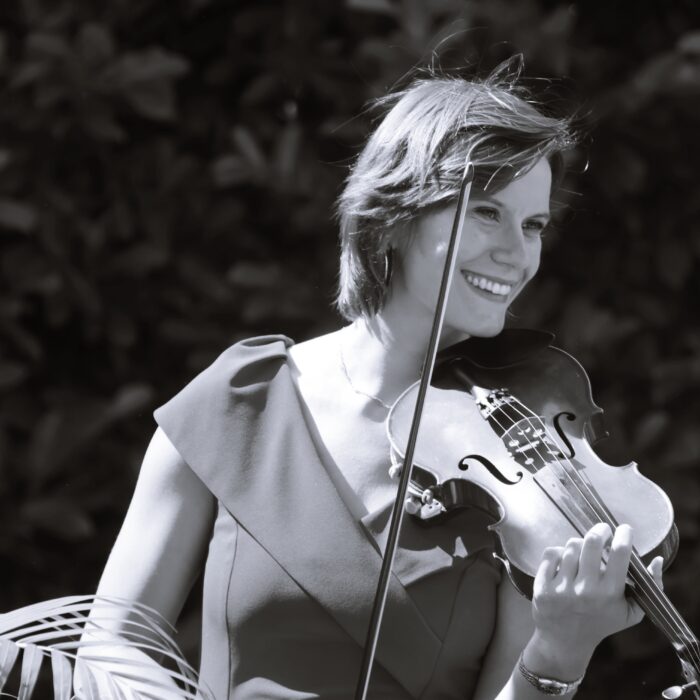
Q & A: Soprano Charlotte Bowden On Her Performances In Works By Monteverdi & Purcell
By Alan NeilsonOperaWire met up with English soprano Charlotte Bowden between performances of Monteverdi’s “Il Ritorno di Ulisse in Patria” and a double Purcell bill of “Hail! Bright St. Cecilia” and “Dido and Aeneas” at the Ravenna festival, in which she was essaying the roles of Melanto, a solo soprano and Belinda, respectively.
Although she only recently graduated from the Royal College of Music Opera Studio, she has already taken large strides towards establishing herself on both the British and European stages, having won second prize at the Innsbruck Festival of Early Music’s Cesti Competition and at the International Handel Singing Competition at the London Handel Festival. She has elicited a series of excellent reviews in which critics have commented on her “amazing coloratura,” “outstanding” performances, and “guileless charm.” Although she has achieved significant success in singing baroque music, she certainly does not restrict herself to this field and has appeared in roles ranging from Zerlina and Barbarina to the Governess in Britten’s “Turn of the Screw.”
OperaWire: What was your pathway into a career in opera?
Charlotte Bowden: I grew up in a musical family. My parents were semi-professional musicians, and I think both of them would have liked to have had careers in music, but it wasn’t really an option. My father is an excellent trombone player, and my mum studied music at university, and I think she would have liked to have become an orchestra manager.
They wanted to give me and my two sisters as many opportunities as possible to be creative. So, I was involved in music from a really early age. My older sister is a folk musician in a band called “Emily and the Simons.” She plays the fiddle, writes folk music and teaches folk dancing. The school that I attended was very musical, which meant plenty of opportunities to be involved with music. We put on a couple of operas when I was in the sixth form. We did a “Venus and Adonis” and a “Dido and Aeneas,” in which I played the role of Dido. The Head of Music was very supportive and created an environment in which we could grow as musicians.
So, in my early years, I was surrounded by music. I then followed a traditional pathway into opera. I studied at the Junior Guildhall for a few years, then enrolled as an undergraduate at the Royal Academy of Music, then went to the Royal College of Music for my master’s and then on to its opera school.
OW: How would you describe your voice?
CB: I would say that I’m a light lyric with an interest in early music. Reviewers often use the word limpid to describe my voice, and many people pick up a quality, of sadness and melancholy. It’s a light voice, and I enjoy some movement, but as it has a lyrical quality it doesn’t move as fast as some roles require. I have a coloratura but would not be able to sing Queen of the Night.
OW: You have had quite a lot of success singing baroque music, both in competitions and with roles such as Belinda and Melanto, both of which you are singing here in Ravenna. What do you like about the baroque?
CB: At the moment, I seem to be singing a lot of baroque music, and it feels very comfortable. I love the feeling that singing baroque gives me because it’s a very collaborative form of opera, and it makes me feel that I’m closer to an instrument, almost as if I am part of the orchestra. I also enjoy creating my own ornamentations. For inspiration, I often listen to singers or composers that I like. It gives me the freedom to be more experimental and to be more expressive with the voice.
I think that baroque appeals to the musician in me rather than my diva side.
OW: Do you see yourself remaining within the baroque field or moving into other genres?
CB: Even though I love the baroque, I want to develop a wider repertoire. I love singing Mozart; his music is a really good fit for my voice. I also love Britten; there’s something in his writing that feels quite similar to how I sing baroque because the emotion is driven by the text, and I think he writes for the voice incredibly well once you’ve studied it and found your way; it feels very natural and intuitive. I really enjoy interpreting characters that are complicated with interesting psychological sides to their nature. I sang the Governess in “The Turn of the Screw” at Waterperry Opera last summer, which was a great experience, and I really liked working with Rebecca Meltzer. So, no I don’t see myself singing solely in the baroque.
OW: What were the challenges in singing Melanto in “Il Ritorno di Ulisse in Patria?”
CB: I was quite apprehensive about singing a Monteverdi role in Italy as an English non-Italian speaker. It was very challenging but also an amazing experience being surrounded by the flavor of the language and seeing how Italian speakers approach the style and delivery of the text. There is so much emotion in the way they deliver all of their lines, which I think is incredibly important in a work with so many recitatives; if the lines are not rooted in real emotions, they can fall a little flat if you’re not careful.
I also consider myself to be very fortunate to have been able to work and learn from Ottavio Dantone. He talks about keeping the tactus moving in the recitatives and finding the beats within the bass but also about finding the flexibility within the tactus of the language and expression. I found this very interesting, as I am often encouraged to be very free with the recitatives, which can lead to them being dictated by the words, and I don’t think too much about what is written underneath. I think Dantone has helped a lot in this respect. It took me some time to adjust because I had prepared in a slightly different way, but it works well as it keeps everything moving while allowing the singer enough flexibility to be expressive; you don’t find yourself losing that sense of momentum, which is important in a recitative-heavy opera. It is a style that I’ve not come across before, but I definitely would take it forward with me when preparing other roles.
Within the opera, Melanto and Eurimaco are the light within what is a dark, serious and sombre drama, and so for me it was really important to play her as a real character but also to ensure that she had the necessary light and youthfulness to act as a foil for what was happening around her.
It was really lovely to work with Žiga Čopi, who played Eurimaco. It was really interesting for me to work with someone who was also performing a role for the first time in a major production.
During rehearsals, although they occasionally spoke English, often they would speak in Italian, which could be difficult. It was a steep learning curve, but with my knowledge of Italian musical terms and the context of what we were doing, I managed to understand. It was a great learning experience.
OW: In the second opera, you performed Belinda in “Dido and Aeneas” and a solo soprano role in “Hail! Saint Cecilia.” Could you explain how the two pieces were presented?
CB: The concept arises from the fact that Purcell wrote “Dido and Aeneas” for a group of students at a school. We are, therefore, students at a conservatoire on St. Cecilia’s day and come together for a sort of party in which we sing and dance and are enjoying ourselves being creative. The centerpiece is a performance of “Dido and Aeneas,” which is presented as a play. The “Ode to Saint Cecilia” forms the parts on either side of “Dido.”
OW: What challenges did you find playing the role of Belinda?
CB: While I was still at school, I played the title role in “Dido.” It was the first opera I played in, so it holds a special place in my memory. Actually, that was the only time I played Dido; perhaps when I get a bit older, I’ll return to her. On the other occasions, I sang Belinda. She is quite a tricky character. Finding the right balance between serving and supporting Dido while ensuring that Belinda is a character in her own right needs to be carefully managed.
I love the music, but it can be quite a difficult sing as it sits in the upper passaggio. Even though it is in English, it is still quite difficult to make the text speak clearly; however, as I am the only English singer in the cast, I am already on a forward foot, but it has actually been very interesting, and I was very happy with my performance.
OW: What were your thoughts about the non-musical side of the productions?
CB: It was very interesting for me to work in a production with a very visual and aesthetic approach. It almost felt like the director, Pier Luigi Pizzi, was painting with humans. It took me a little time to adapt, but I was very happy with it.
OW: Reflecting on your performance, what aspects were you pleased with?
CB: I think there’s always some adrenaline on the first night, and as we only have two performances of each show, I felt under a lot of pressure to produce my best. Fortunately, I think it went very well.
I found my opening scene quite a challenge, as it requires physical strength; I have to stand on a raked bed on one foot, and that is quite a difficult way to start singing.
As a young soprano, it can often feel that you always need to bring physicality, frivolity and sincerity to a role, which is the case in my relationship with Eurimaco. However, as Melanto, I also have the opportunity of relating to Penelope, a character who is endlessly pining for someone who is unlikely to return. I wanted to bring out my feelings of frustration and to encourage her to embrace the future and new possibilities, yet at the same time I also wanted to make sure that I was approaching her with kindness and consideration. Also, I needed to retain the character of a young woman. Overall, I was very pleased with my characterization.
I also enjoyed the theatre; when you sing, you can really feel the sound.
OW: Do you have an approach to developing and understanding your character?
CB: I am very conscious that I don’t want to come across as a caricature. I always try to find a truth within myself that relates to the character I am playing, so that I am able to play a version of myself. I need to find at least one nugget of truth from within myself that I can distill and grow into a real character. This is how I approach every role; I need to root the character in a truth so I can communicate with the audience in a genuine way.
OW: How do you see your career progressing over the short to medium term?
CB: I would love to keep singing baroque roles, but as I said before, I would like to widen my repertoire. Within the next five years or so, I would love to sing Sophie from “Der Rosenkavalier;” it is a role that would suit my voice, and Strauss is one of my favorite composers. Sharp Ears from Janacek’s “The Cunning Little Vixen” is another role I would love to sing. In the shorter term, I would like to sing the title role in Handel’s “Semele” and some of the lighter bel canto roles.



